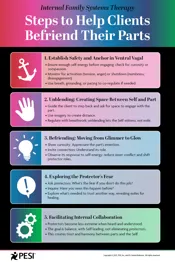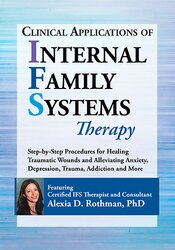Helping Clients Befriend Their Hyperaroused and Hypoaroused Parts

As therapists, we often witness how trauma and adversity shape our clients’ inner landscapes. Many struggle with parts of themselves that are locked in survival states either hyperaroused (fight-or-flight) or hypoaroused (shutdown, freeze). Internal Family Systems (IFS) therapy and Polyvagal Theory (PVT) offer a powerful framework to help clients develop attuned, trusting relationships with these parts, ultimately fostering healing and resilience.
Understanding the Internal Survival System
From a Polyvagal perspective, our nervous system operates in predictable ways in response to perceived safety or threat. When safety is compromised:
- The sympathetic nervous system activates, fueling hyperarousal: Anger, anxiety, agitation, or a need to fight, flee, or fix.
- The dorsal vagal state triggers hypoarousal: Numbness, collapse, withdrawal, or dissociation.
- A regulated, ventral vagal state allows connection, curiosity, and presence.
In IFS therapy, different protector parts take on roles to manage these survival responses:
- Managers try to prevent vulnerability through control, perfectionism, or hypervigilance.
- Firefighters step in reactively with impulsive or numbing behaviors like substance use, avoidance, or aggression.
- Exiles carry deep wounds, often linked to past trauma, and are suppressed to keep the system functioning.
These survival-based parts aren’t "bad"—they developed as adaptive responses. However, they often operate in extreme ways that leave clients feeling fragmented, stuck, or unable to self-regulate.
The Role of the Therapist: Self-Led Presence and Co-Regulation
IFS founder Dick Schwartz highlights that the therapist’s internal state significantly impacts how quickly clients can access their Self—the core, unburdened, compassionate center. When we are Self-led, we offer a stable, co-regulating presence that helps clients build trust with their own system.
In therapy, our goal is to help clients:
- Unblend from extreme states without shaming or forcing separation.
- Befriend protector parts by approaching them with curiosity and appreciation.
- Anchor in ventral vagal states before exploring survival-driven parts.
Steps to Help Clients Befriend Their Parts:
1. Establish Safety and Anchor in Ventral Vagal
Before engaging with hyper- or hypoaroused parts, ensure that at least a critical mass of Self-energy is present. In IFS, this means checking: How do you feel toward this part? If the answer contains curiosity, compassion, or appreciation, there is enough Self-energy to proceed.
From a PVT perspective, therapists should track autonomic state shifts in the moment:
- Is the client becoming too flooded with sympathetic energy (rapid speech, tension, anger)?
- Are they slipping into dorsal vagal shutdown (slowed responses, disengagement, numbness)?
- If needed, invite gentle co-regulation through breath, grounding, or slowing the pace.
2. Unblending: Creating Space Between Self and Part
If a part is overwhelming the system, guide the client to step back slightly. Techniques include:
- Asking the part, Would you be willing to give a little space so we can get to know you better?
- Using imagery (e.g., visualizing the part moving to a conversational distance).
- Regulating physiological responses by engaging the vagal brake (breathwork, orienting to safety).
Unblending is not about exile. It’s about allowing the Self to witness and engage rather than be overtaken.
3. Befriending: Moving from Glimmer to Glow
Deb Dana describes befriending as learning to turn toward autonomic states with curiosity and compassion. With clients, this means:
- Extending curiosity: Can you let this part know you appreciate its intention?
- Inviting bidirectional connection: What does this part want you to understand about its role?
- Observing the part’s response to Self-energy: Does it relax, become more open, or shift slightly?
This process transforms extreme protector roles into preferred, more regulated roles, reducing inner conflict.
4. Exploring the Protector’s Fear
Most protectors operate from a deep fear that if they relax their strategy, harm will occur. Ask:
- What are you afraid would happen if you didn’t do this job?
- Have you seen that happen before?
- What would it need to trust that there’s another way?
Understanding the protector’s fears often reveals underlying exiles that hold deep wounds, allowing for further healing work.
5. Facilitating Internal Collaboration
As protectors feel heard and understood, they become less extreme and more open to working in harmony. The goal is not to eliminate protectors, but to restore balance by allowing Self to lead. This creates an internal system where parts trust each other and the Self.
Integration: Expanding the Capacity for Connection
When clients befriend their survival-driven parts, they develop greater nervous system flexibility and resilience. They learn that:
- They are not their survival states. These are strategies, not identities.
- They can access Self-energy to regulate, rather than being controlled by past trauma.
- Trust and safety can exist internally, even when the external world feels uncertain.
By integrating IFS and Polyvagal Theory, we offer clients a roadmap to self-connection and healing—one where their hyperaroused and hypoaroused parts become allies, not enemies.
Keep in mind that slower is faster. By pacing interventions and prioritizing Self-led presence, we create conditions where deep transformation can unfold not through force, but through compassionate connection.
Download this free printable infographic to help clients befriend their parts.

Download this free printable infographic to help clients befriend their parts

After decades of clinical innovation and recent scientific research, the empirically validated Internal Family Systems (IFS) model has been shown to be effective at improving clients’ general...

Get integrative Polyvagal strategies for CBT, Internal Family Systems, DBT, Somatic Therapy & MORE! Get interventions for trauma, anxiety, depression & more!





